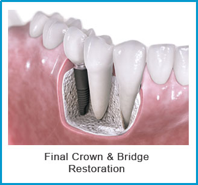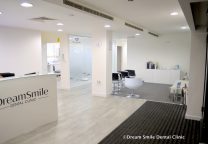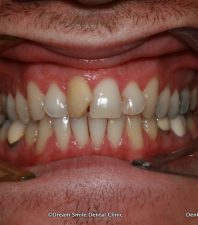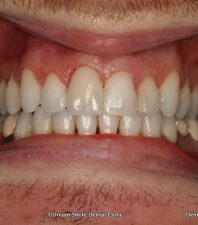Dental implants is a permanent tooth replacement method that closely resembles natural teeth. Not only is the top portion replaced but also the root that securely holds the tooth in place.
The ‘root’ is made of titanium and is designed to fuse to jaw bone as a secure foundation. Dental implants often look, feel and function like natural teeth.
Dental implants can often be used to replace a single tooth, several teeth, all of your missing teeth or help retain bridges and dentures.
How it works
Back to top
Implants are made from titanium which is bio-compatible and can bond strongly to the living bone tissue. The bone tissue grows onto the surface of the implant. This is called osseo-integration and bio-integration. You may hear us use these terms.
When fixed firmly within the jaw bone, the implant will be strong enough to bear the daily forces of chewing and normal function.
If the implant fails to integrate with the jaw bone, the implant will not be strong enough to withstand the forces of chewing and will require removal.
To place an implant we make an incision to open your gums. The implant will be inserted into the jaw bone using special techniques and instruments.
The number of implants inserted will depend on the prosthesis. For example, one implant is used to replace one missing tooth. Or for a complete upper prosthesis having 12 artificial teeth, six implants may be needed.
The incision will be closed either around a ‘healing abutment’ or completely closed with sutures. The bone surrounding the implant will be allowed to heal for up to 3 months.
Healing
After healing, an ‘abutment’ will be inserted through the gums and into the implant. This can be done under a local anaesthetic. The abutment is the foundation, support or connector for the prosthesis. The gums around the abutments are allowed to heal for several weeks.
Testing
We will then test the implant to see if it has properly integrated with the bone. This is important because the implants must be strong enough to support the prosthesis and withstand the forces of chewing and normal function. If the implants have been successful, we will begin work on the prosthesis. The prosthesis may be fixed to the implant with cement or screws so that it is not removable. Or it may be attached in a way that allows it to be removed for cleaning. These are called ‘over dentures’.
Restoration
When the impressions of your mouth are made and before the prosthesis is finished, we will discuss the appearance of the prostheses with you. If you have ideas or concerns about the appearance of the prosthesis make sure you discuss them with us. Cleanliness is crucial. Implants, prostheses, gums and remaining teeth must be thoroughly cleaned every day so they stay free of dental plaque. Constant attention to cleanliness will improve the chances of the implants being successful. Implant hygiene is a life – time commitment for you as the patient and us as your dental team.
Benefits of dental implants
Back to top

Improved Facial Appearance
When teeth are lost, ongoing shrinkage of the jawbone often occurs and this could makes the face look older or sunken in. Dental implants can usually slow or stop this process. Dental implants may help preserve the integrity of the facial structure and the associated jaw bones. This may result in a more youthful and improved facial appearance.
Improved Comfort
Dental implants often eliminates the pain and discomfort of removable full or partial dentures. Since dentures sit on top of the gums and jawbone, continuous shrinkage of the jaw bone alters the fit of the denture resulting in slipping or rocking of the dentures. Exposed nerves, irritation or ulceration of the gum tissue may add to the discomfort. Implant supported replacement teeth are closer to natural teeth because they are anchored securely to your jawbone. Gum irritation, ulcers and the pain of exposed nerves that may be associated with conventional full or partial dentures are often eliminated.
Eat Better
Dental implants can restore chewing efficiency comparable to that of natural teeth. Unlike dentures they do not move when you chew on them. This helps you to eat your favourite foods with confidence and without pain. A full upper denture covers the palate of the mouth and reduces the ability to taste foods. With dental implants the palate is naturally exposed. This allows the wonderful tastes, textures and temperatures of food and drink to be appreciated and enjoyed.
Confidence
Dental implants can eliminate the numerous embarrassing inconveniences of removable partial and full dentures. You will eliminate the use of gooey denture adhesives that may be used. You may feel much more confident knowing that you never need to cover your mouth when you laugh or smile, for fear that your teeth could pop out or fall down.
Protect Your Remaining Natural Teeth
Dental implants may be more appropriate than a bridge for the replacement of one or more adjacent teeth. With conventional bridgework, the teeth surrounding the missing teeth must be ground down. Dental implants eliminates the need to modify these teeth.








